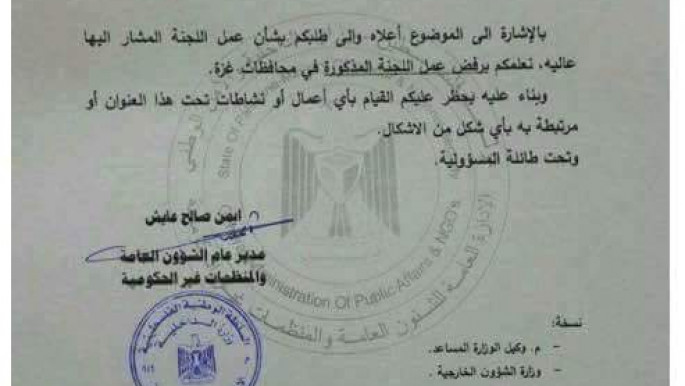Palestinian-Sahrawi solidarity trumped by Morocco-Hamas power politics, campaigners allege
Relations between armed and nonviolent resistance groups in Palestine and Western Sahara go back to the mid-1970s.
But a new Palestinian solidarity committee with the Sahrawi people has been recently banned in Gaza.
George Habash, the founder of the leftist Popular Front for the Liberation of Palestine (PFLP), visited the Sahrawi refugee camps in 1979 and met with several Polisario officials, including current Secretary-General Brahim Ghali.
His visit came after Alwali Mustapha Sayed, a co-founder of the Polisario Front and mastermind of the armed struggle in Western Sahara, encountered Habash in Lebanon in the early 1970s. The people of Palestine and Western Sahara had in the Balfour declaration and the Madrid accord suffered similar fates at the hands of colonial powers - the fallout of which continues in the two lands today.
While Balfour's letter called for a Jewish national homeland in Palestine, the Madrid declaration sought the partitioning of the Western Sahara among Morocco, Spain and Mauritania - without the consent of the indigenous Sahrawis, and called for a referendum that has never taken place.
This common history has fuelled sentiments of solidarity between Sahrawi groups and their Palestinian counterparts.
But after four years of online activism, Mohamed Ahmed Madi, an affiliate of the PFLP in Gaza collaborated with some Sahrawi activists to form a Palestinian solidarity committee for the Sahrawi people in September this year.
But the committee was not granted permission to work in the Gaza Strip, and a document signed by the Palestinian interior ministry was released to prohibit any activities conducted under the banner of the Palestinian Committee for Solidarity with the Sahrawi people.
"We want to inform you that any activities executed by this committee are banned in Gaza," the statement reads.
 |
|
| The Palestinian decree outlining the prohibition of the group's activities was given to moroccan media before activists, campaigners allege [Habibulah Lamin] |
Madi, head of the solidarity group, expressed his discontent.
"The Palestinian authorities did not tell me anything at all, and this document was posted online by Moroccan media," he told The New Arab.
Hamas, the ruling party of Gaza, and the ruling Moroccan Justice and Development party, have themselves developed relations throughout the past ten years.
This, analysts say, has made it almost impossible for progressive voices to mobilise support in Palestine for an independence movement in Western Sahara, which Morocco invaded in 1975.
Back in 2012, Hamas leader Khaled Meshaal was received at the seventh congress of Morroco's PJD, and was cheered as the superstar of the convention. Morocco's King Mohamed VI is also the head of the OIC's Al-Quds committee.
Despite this high-level support between the power centres, Mohamed and his grassroots Palestinian comrades continue to back the Sahrawi people in their quest for independence.
On Monday, a delegation of the Palestinian solidarity committee attended the Sahrawi trade union congress in Boujdour refugee camp for Western Saharans in south-west Algeria.
The Palestinian committee is now an online platform, where Sahrawi and Palestinian activists share ideas on how to confront the sieges against them.
Now the framework of this initiative is based on a Facebook page as a space to attract sympathisers, who are not reachable outside the virtual world under the present circumstances.
The blocking of the Gazan group's activities came after strong pressure from the Moroccan Justice and Development Party on Hamas, said activists at the conference - which goes some way to explaining how Moroccan websites obtained the Gaza government's document before the solidarity committee's organiser.
"The PJD has pressurised the Islamist resistance movement Hamas to prevent our work and it was played with in the Moroccan media," Mohamed Ahmed Madi told The New Arab.
As a result, the committee is focusing on an international strategy. Most recently, it wrote to EUCOCO, the European Conference for Solidarity with the Sahrawi people, to reiterate its stance, backing an independent state in Western Sahara.
Madi and his team also reaffirmed their commitment to back the Sahrawi demand for freedom to the trade unionists of the Sahwari refugee camps with a simple message:
"We call for a free home for the Sahrawi people."
Habibulah Mohamed Lamin is a journalist based in the Western Sahara refugee camps in Tindouf, Algeria. He has worked as a translator and is director of Equipe Media Branch, a group of media activists covering Western Sahara. His work focuses on politics and culture of the Maghreb.
Follow him on Twitter: @habibullahWS





 Follow the Middle East's top stories in English at The New Arab on Google News
Follow the Middle East's top stories in English at The New Arab on Google News


